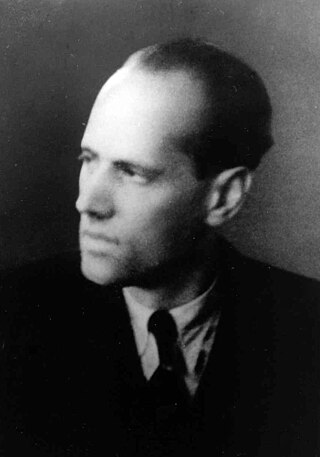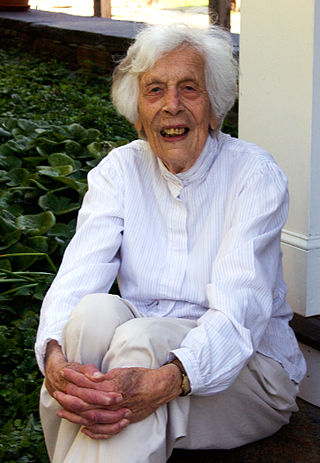Related Research Articles

The Schlieffen Plan is a name given after the First World War to German war plans, due to the influence of Field Marshal Alfred von Schlieffen and his thinking on an invasion of France and Belgium, which began on 4 August 1914. Schlieffen was Chief of the General Staff of the German Army from 1891 to 1906. In 1905 and 1906, Schlieffen devised an army deployment plan for a decisive (war-winning) offensive against the French Third Republic. German forces were to invade France through the Netherlands and Belgium rather than across the common border.

The Kreisau Circle (1940–1944) was a group of about twenty-five German dissidents in Nazi Germany led by Helmuth James von Moltke, who met at his estate in the rural town of Kreisau, Silesia. The circle was composed of men and a few women from a variety of backgrounds, including those of noble descent, devout Protestants and Catholics, intellectuals, military personnel, socialists and conservatives. Despite their differences, the members of the Kreisau Circle found common interest in their opposition to Hitler's regime on moral and religious grounds. At their meetings, the circle discussed how they would reorganize the German government after the end of the Third Reich.

The German General Staff, originally the Prussian General Staff and officially the Great General Staff, was a full-time body at the head of the Prussian Army and later, the German Army, responsible for the continuous study of all aspects of war, and for drawing up and reviewing plans for mobilization or campaign. It existed unofficially from 1806, and was formally established by law in 1814, the first general staff in existence. It was distinguished by the formal selection of its officers by intelligence and proven merit rather than patronage or wealth, and by the exhaustive and rigorously structured training which its staff officers undertook.

Helmuth Karl Bernhard Graf von Moltke was a Prussian field marshal. The chief of staff of the Prussian Army for thirty years, he is regarded as the creator of a new, more modern method of directing armies in the field and one of the finest military minds of his generation. He commanded troops in Europe and the Middle East, in the Second Schleswig War, Austro-Prussian War and Franco-Prussian War. He is described as embodying "Prussian military organization and tactical genius". He was fascinated with railways and pioneered their military use. He is often referred to as Moltke the Elder to distinguish him from his nephew Helmuth von Moltke the Younger, who commanded the German Army at the outbreak of the First World War.

Helmuth Johannes Ludwig Graf von Moltke, also known as Moltke the Younger, was a German general and Chief of the Great German General Staff, a member of the House of Moltke. He was also the nephew of GeneralfeldmarschallGraf Helmuth Karl Bernhard von Moltke, who is commonly called "Moltke the Elder" to differentiate the two.

Helmuth James Graf von Moltke was a German jurist who, as a draftee in the German Abwehr, acted to subvert German human-rights abuses of people in territories occupied by Germany during World War II. He was a founding member of the Kreisau Circle opposition group, whose members opposed the government of Adolf Hitler in Nazi Germany, and discussed prospects for a Germany based on moral and democratic principles after Hitler. The Nazis executed him for treason for his participation in these discussions.

Alfred Ludwig Heinrich Karl Graf von Waldersee was a German field marshal (Generalfeldmarschall) who became Chief of the Imperial German General Staff.
Fritz Fischer was a German historian best known for his analysis of the causes of World War I. In the early 1960s Fischer advanced the controversial thesis at the time that responsibility for the outbreak of the war rested solely on Imperial Germany. Fischer's anti-revisionist claims shocked the West German government and historical establishment, as it made Germany guilty for both world wars, challenging the national belief in Germany's innocence and converting its recent history into one of conquest and aggression.

The identification of the causes of World War I remains a debated issue. World War I began in the Balkans on July 28, 1914, and hostilities ended on November 11, 1918, leaving 17 million dead and 25 million wounded. Moreover, the Russian Civil War can in many ways be considered a continuation of World War I, as can various other conflicts in the direct aftermath of 1918.

Hugo von Pohl was a German admiral who served during the First World War. He joined the Navy in 1872 and served in various capacities, including with the new torpedo boats in the 1880s, and in the Reichsmarineamt in the 1890s. He eventually reached the rank of Vizeadmiral and held the position of Chief of the Admiralty Staff in 1913. He commanded the German High Seas Fleet from February 1915 until January 1916. As the commander of the surface fleet, he was exceedingly cautious, and did not engage the High Seas Fleet in any actions with the British Grand Fleet. Pohl was an outspoken advocate of unrestricted submarine warfare, and he put the policy into effect once he took command of the fleet on 4 February 1915. Seriously ill from liver cancer by January 1916, Pohl was replaced by Reinhard Scheer that month. Pohl died a month later.

The Oberste Heeresleitung was the highest echelon of command of the army (Heer) of the German Empire. In the latter part of World War I, the Third OHL assumed dictatorial powers and became the de facto political authority in the Empire.
Terence Zuber is an American military historian specializing in the First World War. He received his doctorate from the University of Würzburg in 2001 after serving for twenty years as an infantry officer in the United States Army. He has advanced the controversial thesis that the Schlieffen Plan as generally understood was a post-World War I fabrication.

Freya von Moltke was a German American lawyer and participant in the anti-Nazi opposition group, the Kreisau Circle, with her husband, Helmuth James von Moltke. During World War II, her husband acted to subvert German human-rights abuses of people in territories occupied by Germany and became a founding member of the Kreisau Circle, whose members opposed the government of Adolf Hitler.

Georg Alexander von Müller was an Admiral of the Imperial German Navy and a close friend of the Kaiser in the run up to the First World War.

Germany's Aims in the First World War is a book by German historian Fritz Fischer. It is one of the leading contributions to historical analysis of the causes of World War I, and along with this work War of Illusions(Krieg der Illusionen) gave rise to the "Fischer Thesis" on the causes of the war. The title translates as "Grab for World Power". or "Bid for World Power". Essentially Fischer attempts to link together a continuum of German belligerence in its "grab for power" weaving it all together into a cohesive theme of German Weltpolitik.
Historians writing about the origins of World War I have differed over the relative emphasis they place upon the factors involved. Changes in historical arguments over time are in part related to the delayed availability of classified historical archives. The deepest distinction among historians remains between those who focus on the actions of Germany and Austria-Hungary as key and those who focus on a wider group of actors. Meanwhile some historians, such as Fritz Fischer, maintain that Germany deliberately sought war while others do not. The main distinction among the latter is between those who believe that a war between the "Great Powers" was ultimately unplanned but still caused principally by Germany and Austria-Hungary taking risks, and those who believe that either all or some of the other powers, namely Russia, France, Serbia and Great Britain, played a more significant role in risking war than had been traditionally suggested.

The Yugoslav monitor Sava is a Temes-class river monitor that was built for the Austro-Hungarian Navy as SMS Bodrog. She fired the first shots of World War I just after 01:00 on 29 July 1914, when she and two other monitors shelled Serbian defences near Belgrade. She was part of the Danube Flotilla, and fought the Serbian and Romanian armies from Belgrade to the mouth of the Danube. In the closing stages of the war, she was the last monitor to withdraw towards Budapest, but was captured by the Serbs when she grounded on a sandbank downstream from Belgrade. After the war, she was transferred to the newly created Kingdom of Serbs, Croats and Slovenes, and renamed Sava. She remained in service throughout the interwar period, although budget restrictions meant she was not always in full commission.
Johannes Tautz (30 September 1914 in Koblenz am Rhein to 13 March 2008 in Dortmund, was a historian, religious scholar, Anthroposophist, author and Waldorf teacher. He concerned himself with a better understanding of National Socialism and with questions of education in the twentieth century.
Wilhelm Deist (1931–2003) was a German historian and author who specialised in the European history of 19th and 20th with an emphasis on the history of World War I. Deist was senior historian at the Military History Research Office (MGFA) and honorary professor at the University of Freiburg. Deist was a widely published author and a chief editor of the seminal series Germany and the Second World War from the MGFA.

Germany entered into World War I on August 1, 1914, when it declared war on Russia. In accordance with its war plan, it ignored Russia and moved first against France–declaring war on August 3 and sending its main armies through Belgium to capture Paris from the north. The German invasion of Belgium caused Britain to declare war on Germany on August 4. Most of the main parties were now at war. In October 1914, Turkey joined the war on Germany's side, becoming part of the Central Powers. Italy, which was allied with Germany and Austria-Hungary before World War I, was neutral in 1914 before switching to the Allied side in May 1915.
References
- 1 2 Profile of Professor Annika Mombauer at Open University
- ↑ CONFERENCE: Partisan and Anti-partisan Warfare in German-Occupied Europe, 1939-1945
- ↑ "Section Editors". 1914-1918 Online: International Encyclopedia of the First World War. Archived from the original on 6 March 2014. Retrieved 28 February 2014.
- ↑ BBC Radio 4, February 2014, The Great War of Words by Michael Portillo
- ↑ BBC 2, February 1914, The Necessary War by Max Hastings